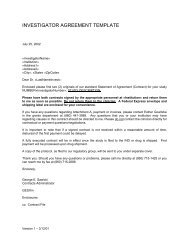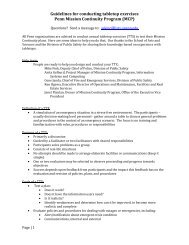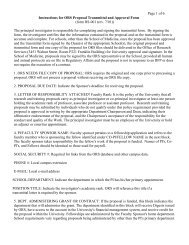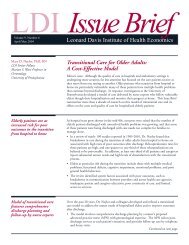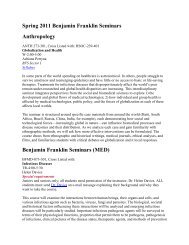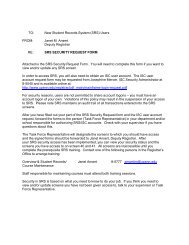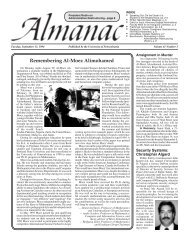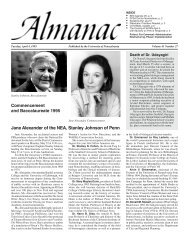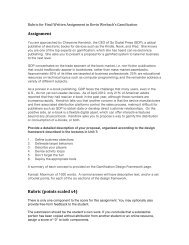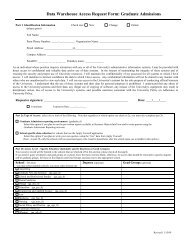2009-2010 COURSE REGISTER - University of Pennsylvania
2009-2010 COURSE REGISTER - University of Pennsylvania
2009-2010 COURSE REGISTER - University of Pennsylvania
You also want an ePaper? Increase the reach of your titles
YUMPU automatically turns print PDFs into web optimized ePapers that Google loves.
on the variety <strong>of</strong> black responses to<br />
enslavement and forced acculturation in the<br />
New World. The differences in the slave<br />
experiences <strong>of</strong> various New World<br />
countries, and the methods <strong>of</strong> black<br />
resistance and rebellion to the slave system<br />
will be investigated. The nature and role <strong>of</strong><br />
free black communities in antebellum<br />
America will be studied.<br />
177. (HIST177) Afro-American<br />
History 1876-Present. (D) History &<br />
Tradition Sector. All classes. Savage.<br />
A study <strong>of</strong> the major events, issues, and<br />
personalities in Afro-American history<br />
from Reconstruction to the present. The<br />
course will also examine the different slave<br />
experiences and the methods <strong>of</strong> black<br />
resistance and rebellion in the various slave<br />
systems.<br />
190. (AFST190, ANTH190, HIST190)<br />
Introduction to Africa. (A) Society<br />
Sector. All classes. Barnes.<br />
During the semester we will focus on the<br />
people and communities <strong>of</strong> sub-Saharan<br />
Africa and on the ways people represent,<br />
reflect on, and react to various aspects and<br />
issues in their lives and the institutions<br />
which dominate their communities. We<br />
will focus particularly on the history,<br />
contemporary expression, and interrelationships<br />
among politics, religion and<br />
aesthetic practice. Members <strong>of</strong> Penn's<br />
African Studies community will share their<br />
expertise with the class and introduce the<br />
<strong>University</strong>'s Africa resources. Texts consist<br />
<strong>of</strong> weekly readings, films, and recordings;<br />
and class members will be expected to<br />
attend several lectures outside <strong>of</strong> class.<br />
SM 205. (HIST204, LALS204) Major<br />
Seminar in History: America After<br />
1800. (M) Staff. Department Permission -<br />
Permit Required.<br />
This course is cross-listed with HIST 204<br />
(Major Seminar in History: America After<br />
1800) when the subject matter is related to<br />
African, African American, or other<br />
African Diaspora issues.<br />
See the Africana Studies Program's website<br />
www.sas.upenn.edu/africana for a<br />
description <strong>of</strong> the current <strong>of</strong>ferings.<br />
SM 206. (HIST206) Major Seminar <strong>of</strong><br />
the World after 1800. (C) Babou.<br />
Department Permission - Permit Required.<br />
This course is cross-listed with HIST 206<br />
(Major Seminar <strong>of</strong> the World after 1800)<br />
when the subject matter is related to<br />
African, African American, or other<br />
African Diaspora issues. A frequent topic<br />
is "African Intellectual History."<br />
See the Africana Studies Program's website<br />
at www.sas.upenn.edu/africana for a<br />
description <strong>of</strong> the current <strong>of</strong>ferings.<br />
209. (AFST209, ARTH209) African<br />
Art. (M) Staff.<br />
This selective survey will examine a variety<br />
<strong>of</strong> the circumstances <strong>of</strong> sub-Saharan<br />
African art, ranging from imperial to<br />
nomadic cultures and from ancient times to<br />
comtemporary participation in the<br />
international market. Iconography, themes<br />
and style will be concered, as will questions<br />
<strong>of</strong> modernity, religious impact, tradition<br />
and colonialism.<br />
218. (LGST218) Race, Racism, and<br />
American Law. (C) Anderson.<br />
The goal <strong>of</strong> this course is to study the role<br />
the law has played, and continues to play,<br />
in addressing the problems <strong>of</strong> racial<br />
discrimination in the United States.<br />
Contemporary issues such as racial<br />
pr<strong>of</strong>iling, affrimative action, and diversity<br />
will all be covered in their social and legal<br />
context. The basis for discussion will be<br />
assigned texts, articles, editorials and cases.<br />
In addition, interactive videos will also be<br />
used to aid class discussion. Course<br />
requirements will include examinations and<br />
class discussions.<br />
225. (AFST225) African Languages<br />
and Culture. (C) Mbeje. Prerequisite(s):<br />
AFRC 126 or permission <strong>of</strong> the instructor.<br />
Offered through the Penn Language Center.<br />
The aim <strong>of</strong> the course is to provide an<br />
overall perspective on African languages<br />
and linguistics. No background in<br />
linguistics is necessary. Students will be<br />
introduced to theoretical linguistics-its<br />
concepts, theories, ways <strong>of</strong> argumentation,<br />
data collection, data analysis, and data<br />
interpretation. The focus will be on the<br />
languages and linguistics <strong>of</strong> Africa to<br />
provide you with the knowledge and skills<br />
required to handle the language and<br />
language-related issues typical <strong>of</strong> African<br />
conditions. We will cover topics related to<br />
formal linguistics (phonology/phonetics,<br />
morphology, syntax, and semantics),<br />
aspects <strong>of</strong> pragmatics as well as the general<br />
socio-linguistic character <strong>of</strong> African<br />
countries. We will also cover language in<br />
context, language and culture, borrowing,<br />
multilingualism, and cross-cultural<br />
communication in Africa.<br />
SM 230. (AFRC533, SOCI230) Special<br />
Topics in Sociology. (C) Distribution<br />
Course in Society. Class <strong>of</strong> <strong>2009</strong> & prior<br />
only. Charles, Zuberi. This course is crosslisted<br />
with SOCI 430 (Special Topics in<br />
Sociology) when the subject matter related<br />
AFRICANA STUDIES<br />
to African, African American, or other<br />
African Diaspora issues.<br />
Topics vary. Recent courses <strong>of</strong>fered<br />
include "African Urbanization," "Race<br />
Relations in American Cities," and<br />
"Sociology <strong>of</strong> the Black Community."<br />
See the African Studies Program's webiste<br />
at www.sas.upenn.edu/africana for a<br />
description <strong>of</strong> the current <strong>of</strong>ferings.<br />
SM 231. (AFST231, FREN231) Cinema<br />
Francophone. (M) Moudileno.<br />
This course will introduce students to<br />
recent films by major directors from<br />
Francophone Africa. While attention will<br />
be given to aesthetic aspects and individual<br />
creativity, the viewing and discussions will<br />
be mostly organized around a variety <strong>of</strong><br />
(overlapping) themes: History;<br />
Tradition/Modernity; Urban Life; Gender<br />
and Sexuality; Politics. Class conducted in<br />
French.<br />
235. (SOCI235) Law and Social<br />
Change. (C) Fetni.<br />
Beginning with discussion <strong>of</strong> various<br />
perspectives on social change and law, this<br />
course then examines in detail the<br />
interdependent relationship between<br />
changes in legal and societal institutions.<br />
Emphasis will be placed on (1) how and<br />
when law can be an instrument for social<br />
change, and (2) how and when social<br />
change can cause legal change. In the<br />
assessment <strong>of</strong> this relationship, the laws <strong>of</strong><br />
the United States and other countries as<br />
well as international law, will be studied.<br />
Throughout the course, discussions will<br />
include real controversies relevant to social<br />
change such as civil liberties, gender and<br />
the law, and issues <strong>of</strong> nation-building. A<br />
comparative framework will be used in the<br />
analysis <strong>of</strong> this interdependent relationship<br />
between law and social change.<br />
253. (AFST253, ANTH253, FOLK253,<br />
MUSC253, GSOC253) Music and<br />
Performance <strong>of</strong> Africa. (M) Muller.<br />
This class provides an overview <strong>of</strong> the most<br />
popular music styles and discussion <strong>of</strong> the<br />
cultural and political contexts in which they<br />
emerged in contemporary Africa. Learning<br />
to perform a limited range <strong>of</strong> African<br />
music/dance will be a part <strong>of</strong> this course.<br />
No prior performance experience required,<br />
though completion <strong>of</strong> Music 50 is<br />
recommended.<br />
257. (AFST257, PSCI210)<br />
Contemporary African Politics. (C)<br />
Callaghy, Markovits.<br />
The course will consist <strong>of</strong> an analytic<br />
survey <strong>of</strong> contemporary politics in the<br />
states <strong>of</strong> sub-Saharan Africa. It will focus<br />
Page 13




